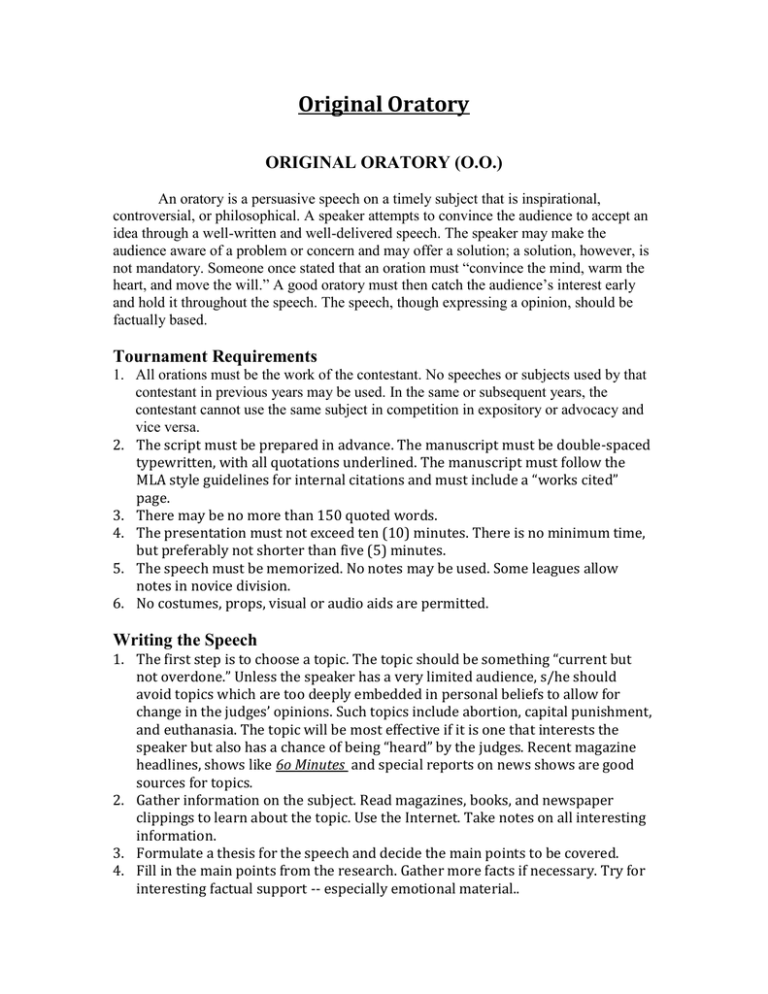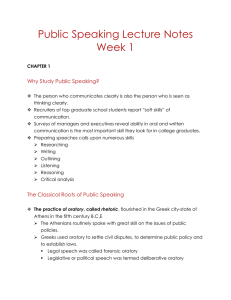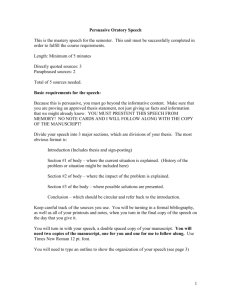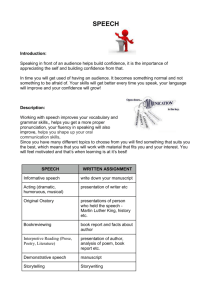Examples of Original Oratory Speeches
advertisement

Original Oratory ORIGINAL ORATORY (O.O.) An oratory is a persuasive speech on a timely subject that is inspirational, controversial, or philosophical. A speaker attempts to convince the audience to accept an idea through a well-written and well-delivered speech. The speaker may make the audience aware of a problem or concern and may offer a solution; a solution, however, is not mandatory. Someone once stated that an oration must “convince the mind, warm the heart, and move the will.” A good oratory must then catch the audience’s interest early and hold it throughout the speech. The speech, though expressing a opinion, should be factually based. Tournament Requirements 1. All orations must be the work of the contestant. No speeches or subjects used by that contestant in previous years may be used. In the same or subsequent years, the contestant cannot use the same subject in competition in expository or advocacy and vice versa. 2. The script must be prepared in advance. The manuscript must be double-spaced typewritten, with all quotations underlined. The manuscript must follow the MLA style guidelines for internal citations and must include a “works cited” page. 3. There may be no more than 150 quoted words. 4. The presentation must not exceed ten (10) minutes. There is no minimum time, but preferably not shorter than five (5) minutes. 5. The speech must be memorized. No notes may be used. Some leagues allow notes in novice division. 6. No costumes, props, visual or audio aids are permitted. Writing the Speech 1. The first step is to choose a topic. The topic should be something “current but not overdone.” Unless the speaker has a very limited audience, s/he should avoid topics which are too deeply embedded in personal beliefs to allow for change in the judges’ opinions. Such topics include abortion, capital punishment, and euthanasia. The topic will be most effective if it is one that interests the speaker but also has a chance of being “heard” by the judges. Recent magazine headlines, shows like 6o Minutes and special reports on news shows are good sources for topics. 2. Gather information on the subject. Read magazines, books, and newspaper clippings to learn about the topic. Use the Internet. Take notes on all interesting information. 3. Formulate a thesis for the speech and decide the main points to be covered. 4. Fill in the main points from the research. Gather more facts if necessary. Try for interesting factual support -- especially emotional material.. 5. Once the body is finished, look for a strong, “audience catching” introduction and conclusion. These are extremely important parts of the speech and special time should be given to their development. Quotations, stories, anecdotes, illustrations, personal experiences, and startling statements are effective. 6. When turning the outline into a manuscript, write complex, yet carefully thought-out sentences using advanced vocabulary and strong emotional appeals. 7. Polish the speech, having someone else look it over for possible alteration, and type a final script. Practicing the Delivery 1. Get the basic format firmly in mind. Read the manuscript silently several times. Then, read it aloud, repeatedly, with vocal expression. Set the manuscript down and try it from memory. Use the manuscript only as a prompt. 2. When the speech is memorized, practice it in front of a mirror. Work at gestures and facial expression, but do not over-rehearse. A good delivery should be conversational yet polished, direct, clearly enunciated, easily heard, and interesting to watch. PREPARING THE BASIC PERSUASION SPEECH I. INTRODUCTORY PARAGRAPH (1-2 minutes) A. Interest device: Use an appropriate quotation, anecdote (true life story) or an allusion/reference to some appropriate book, play, movie, TV. show, etc.) B. Transition: Write a sentence or two that links the interest device to the thesis statement. C. Thesis statement: Make sure the thesis statement (controlling concept or idea for the whole speech) is clear and complete. II. BODY OF SPEECH (6-8 minutes) A. Each paragraph must have a clear topic sentence that clearly tells what concept or argument the paragraph will develop. B. Organizationally, the paragraphs should follow clear, logical progression. C. Paragraphs MUST contain good SPECIFICS to develop the ideas. 1. Use statistics as proof devices. 2. Use quotes from authorities, including individuals or publications. 3. Use empirical (real life) examples. 4. Use allusions (references to specific books, plays, movies, etc.) 5. Use comparisons and/or contrasts to clarify ideas. D. Select words carefully. Use proper grammar and a variety of sentence structures. E. STAY FOCUSED. Do not stray from the thesis. Anything in the speech that cannot be clearly related to the thesis doesn’t belong. F. Use an opening interest device that “ties the speech together.” G. Use well-chosen transitional words and phrases to get from one idea to another. H. Use internal summaries to close out one major idea before changing to another. III. CONCLUSION (1 minute) A. Summarize the major ideas in a sentence or two. B. Restate the thesis. C. Close with a memorable line. Go back to the opening interest device and reuse or adapt it to closing. WRITING HINTS 1. RESEARCH BEFORE WRITING. 2. KNOW THE TARGET. A ten (10) minute speech is approximately 1200-1400 words or approximately four (4) or a little more typed, double-spaced pages, which would be 6-8 pages of handwritten material depending on the size of the handwriting. Two pages of handwritten material will only equal about 2-3 minutes of speaking time. It is better to write too much than too little. 3. DO NOT START AT THE BEGINNING. DO NOT start worrying about an interest device. Write that last. Start with the thesis statement. 4. ALWAYS START WITH AN OUTLINE. Think ideas through first, before beginning to write. As speech preparation progresses, additions/deletions can be made and the order can be changed. It is imperative to have a “map” as a guide for speech preparation. 5. BEFORE MAKING ANY CORRECTIONS, WRITE THE SPEECH COMPLETELY. After the ideas are all written, go back and see what needs improvement. Where is there too much in the way of generalization and too little in the way of specific details? Where is there a need to do some more research? Examples of Original Oratory Speeches: http://www.youtube.com/watch?v=RNXyp2QwYTo&feature=related http://www.youtube.com/watch?v=kZt77YY5X7Y&feature=related SAMPLE TOPICS FOR ORATORY AIDS Apathy Attitudes/Morals Blameshifting Caring Cloning Couch Potato Ethic Do Your Best Drs. as Gods Efficiency Experts Ethics Failure Fear Foster Care Greed Health Importance/Fathers Lack of Honor Liability Materialism Media/Politics Mistakes are OK Need for Diversity Obsession with Fun Originality Popularity Procrastination Quiet Hero Sanctuary Self-Potential Silence Style Tears Touch the Future Trends Verbal Rudeness American Competitiveness Appearance Bankruptcy Boredom vs. Blues Chaos Communication Cultural Literacy Doer vs. Watcher Eccentrics Entrepreneurs Ethnic Literacy Fairy Tales Feelings Friendship Guilt Honesty Individuality Language Evolution Listening Skills Meaning of Life Medical Ethics Money Non-Conformity Open Mind Overuse of Statistics Power Hungry Public Service Racism SAT Setting Goals Social Injustice Success Teen Problems Touching Trust Violence in Media Anger Art Appreciation Be Yourself Cocooning Charisma Cooperation Cynicism Don’t Know/Can Hurt Education Escapism Extremism Family Forgive Yourself Futility of War Happiness Illusion/Reality Judging Others Laughter Loneliness Media Manipulation Mental Illness Name Calling Nostalgia Optimism Peace Pride Questioning Risk Self-esteem Sexual Responsibility Stress Taking Advice Time Trauma Centers Values What’s in a Name





